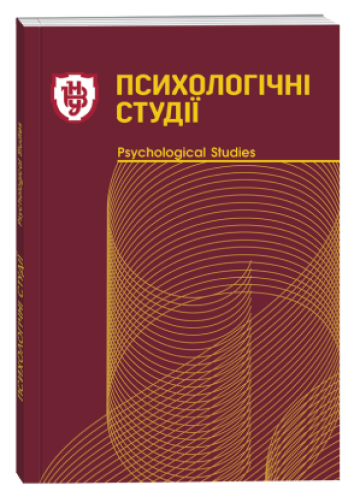ВНУТРІШНІ, ЗОВНІШНІ ТА МНЕМОНІЧНІ ЧИННИКИ ТОЧНОСТІ МЕТАКОГНІТИВНОГО МОНІТОРИНГУ
DOI:
https://doi.org/10.32782/psych.studies/2023.2.1Ключові слова:
aJOLs, aRCJs, gJOLs, gRCJs, ілюзія знання, ілюзія незнання, JOLs, RCJs, навчальні завдання, метакогнітивні судження, точність метакогнітивного моніторингу, надмірна впевненість, виконання завдань, недостатня впевненість.Анотація
У статті проведено дослідження чинників точності метакогнітивного моніторингу навчальних завдань студентів ЗВО. За допомогою експерименту досліджували деякі внутрішні, зовнішні та мнемонічні чинники, такі як тип навчального матеріалу, тип завдання, складність завдання та легкість/складність виконання, на точність метакогнітивного моніторингу. Дослідження проводилося серед 233 студентів університету. Емпіричні результати показують переважання точності метакогнітивного моніторингу, тоді як недостатня впевненість має тенденцію до зниження. Показники точності метакогнітивного моніторингу «+ +» можна знайти в найпростіших завданнях на запам’ятовування пар слів, а показники точності мета- когнітивного моніторингу «– –» – у загальних питаннях середньої складності. Надмірна впевненість проявляється в найскладніших завданнях на дедуктивні умовиводи та логічні аналогії. Результати підтверджують залежність точності метакогнітивного моніторингу від рівня легкості/складності завдань та легкості/складності виконання; рівень складності завдання впливає на вищі показники неточностей метакогнітивних суджень, зокрема у вигляді надмірної впевненості. У запитаннях із відкритою відповіддю переважають судження типу «+ +» і «– –»; показники недостатньої та надмірної впевненості також вищі у запитаннях із відкритою відповіддю. Що складніше завдання, то більша впевненість у складності виконання. Результати можуть бути значущими в процесі розуміння зв’язку між точністю метакогнітивного моніторингу та успішністю навчання студентів університету.
Посилання
Avhustiuk, M., Pasichnyk, I., & Kalamazh, R. (2018). The illusion of knowing in metacognitive monitoring: Effects of the type of information and of personal, cognitive, metacognitive, and individual psychological characteristics. Europe’s Journal of Psychology, 14(2), 317–341 [in English].
Carvalho Filho, de M.K. (2009). Confidence judgments in real classroom settings: Monitoring performance in different types of tests. International Journal of Psychology, 44(2), 93–108 [in English].
Dunlosky, J., & Metcalfe, J. (2009). Metacognition: A textbook for cognitive, educational, life span and applied psychology. SAGE Publications, Inc., 344 p. [in English].
Dunlosky, J., & Rawson, K.A. (2012). Overconfidence produces underachievement: Inaccurate self-evaluations undermine students’ learning and retention. Learning and Instruction, 22, 271–280. Eakin, D. K. (2005). Illusions of knowing: Metamemory and memory under conditions of retroactive interference. Journal of Memory and Language, 52(4), 526–534 [in English].
Flannelly, L.T., & Flannelly, K. J. (2000). Reducing people’s judgment bias about their level of knowledge. The Psychological Record, 50, 587–600.
Glenberg, A.M., Wilkinson, A.C., & Epstein, W. (1982). The illusion of knowing: Failure in the self-assessment of comprehension. Memory and Cognition, 10(6), 597–602 [in English].
Grieco, D., & Hogarth, R.M. (2009). Overconfidence in absolute and relative performance: The regression hypothesis and Bayesian updating. Journal of Economic Psychology, 30(5), 756–771 [in English].
Griffin, D., & Tversky, A. (1992). The weighing of evidence and the determinants of confidence. Cognitive Psychology, 24, 411–435 [in English].
Hӓndel, M., de Bruin, A.B.H., & Dresel, M. (2020). Individual differences in local and global metacognitive judgments. Metacognition and Learning, 15, 51–75 [in English].
Juslin, P., Winman, A., & Olsson, H. (2000). Naive empiricism and dogmatism in confidence research: A critical examination of the hard-easy effect. Psychological Review, 107(2), 384–396 [in English].
Kahneman, D. (2011). Thinking fast and slow. Farrar, Straus and Giroux [in English].
Klayman, J., Soll, J.B., Gonzalez-Vallejo, C., & Barlas, S. (1999). Overconfidence: It depends on how, what, and whom you ask. Organizational Behavior and Human Decision Processes, 79(3), 216–247 [in English].
Koriat, A. (1997). Monitoring one’s own knowledge during study: A cue-utilization approach to judgments of learning. Journal of Experimental Psychology: General, 126, 349–370 [in English].
Koriat, A., Nussinson, R., Bless, H., & Shaked, N. (2008). Information-based and experience- based metacognitive judgments. In J. Dunlosky and R.A. Bjork (Eds.), A Handbook of Memory and Metamemory, 117–134 [in English].
Lin, L.-M., Zabrucky, K., & Moore, D. (1997). The relations among interest, self-assessed comprehension, and comprehension performance in young adults. Reading Research and Instruction, 36(2), 127–139 [in English].
Lovelace, E.A. (1984). Metamemory: Monitoring future recallability during study. Journal of Experimental Psychology: Learning, Memory, and Cognition, 10(4), 756–766 [in English].
Merkle, E.C. (2009). The disutility of the hard-easy effect in choice confidence. Psychonomic Bulletin and Review, 16(1), 204–213 [in English].
Moore, D., & Healy, P.J. (2007). The trouble with overconfidence. Psychological Review, 115(2), 502–517 [in English].
Nietfeld, J.L., Cao, L., & Osborne, J.W. (2005). Metacognitive monitoring accuracy and student performance in the postsecondary classroom. The Journal of Experimental Education, 74(1), 7–28 [in English].
Pallier, G., Wilkinson, R., Danthiir, V., Kleitman, S., Knezevic, G., Stankov, L., & Roberts, R.D. (2002). The role of individual differences in the accuracy of confidence judgments. The Journal of General Psychology, 129, 257–299 [in English].
Parkinson, M.M. (2009). “What did I learn?” and “How did I do?” The relation between metacognition and word learning. In P.A. Alexander (Chair), Meta-what? Measuring Monitoring and Control. Symposium Presented at the Annual Meeting of the American Educational Research Association, 18 p. [in English].
Ramadhanti, D. & Yanda, D.P. (2021). Students’ metacognitive awareness and its impact on writing skill. International Journal of Language Education, 5, 193–206 [in English].
Ranalli, J. (2018). Inaccurate metacognitive monitoring and its effects on metacognitive control and task outcomes in self-regulated L2 learning. TESL-EJ21.8, The Electronic Journal for English as a Second Language, 21 (4), 1–20 [in English].
Serra, M.J., & Metcalfe, J. (2009). Effective implementation of metacognition. In D.J. Hacker, J. Dunlosky, & A. C. Graesser (Eds.), Handbook of metacognition in education, 278–298 [in English].
Thiede, K.W., Anderson, M.C.M., & Therriault, D. (2003). Accuracy of metacognitive monitoring affects learning of text. Journal of Educational Psychology, 95 (1), 66–73 [in English].
Tobias, S., & Everson, H.T. (2002). Knowing what you know and what you don’t: Further research on metacognitive knowledge monitoring. College Board Research Report, 25 p. [in English].







